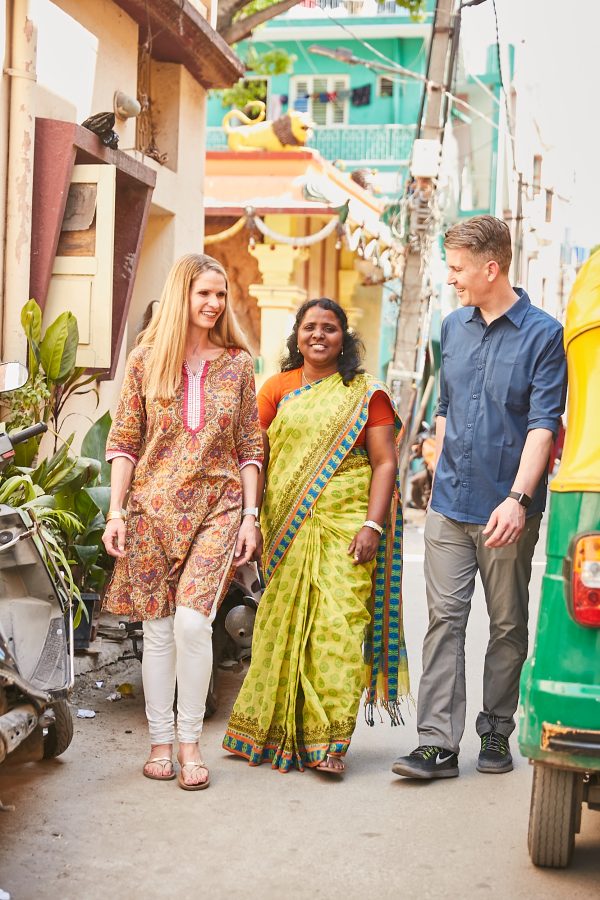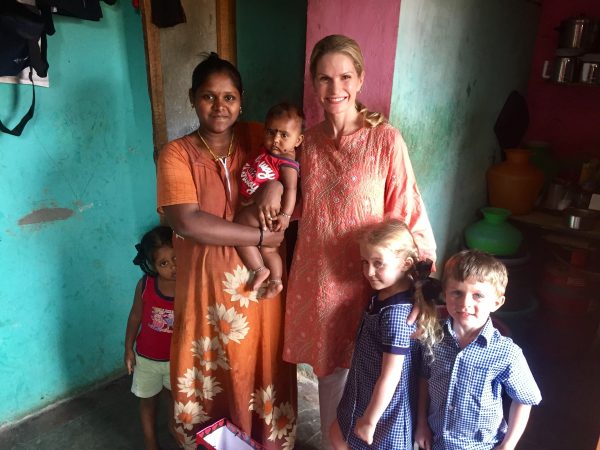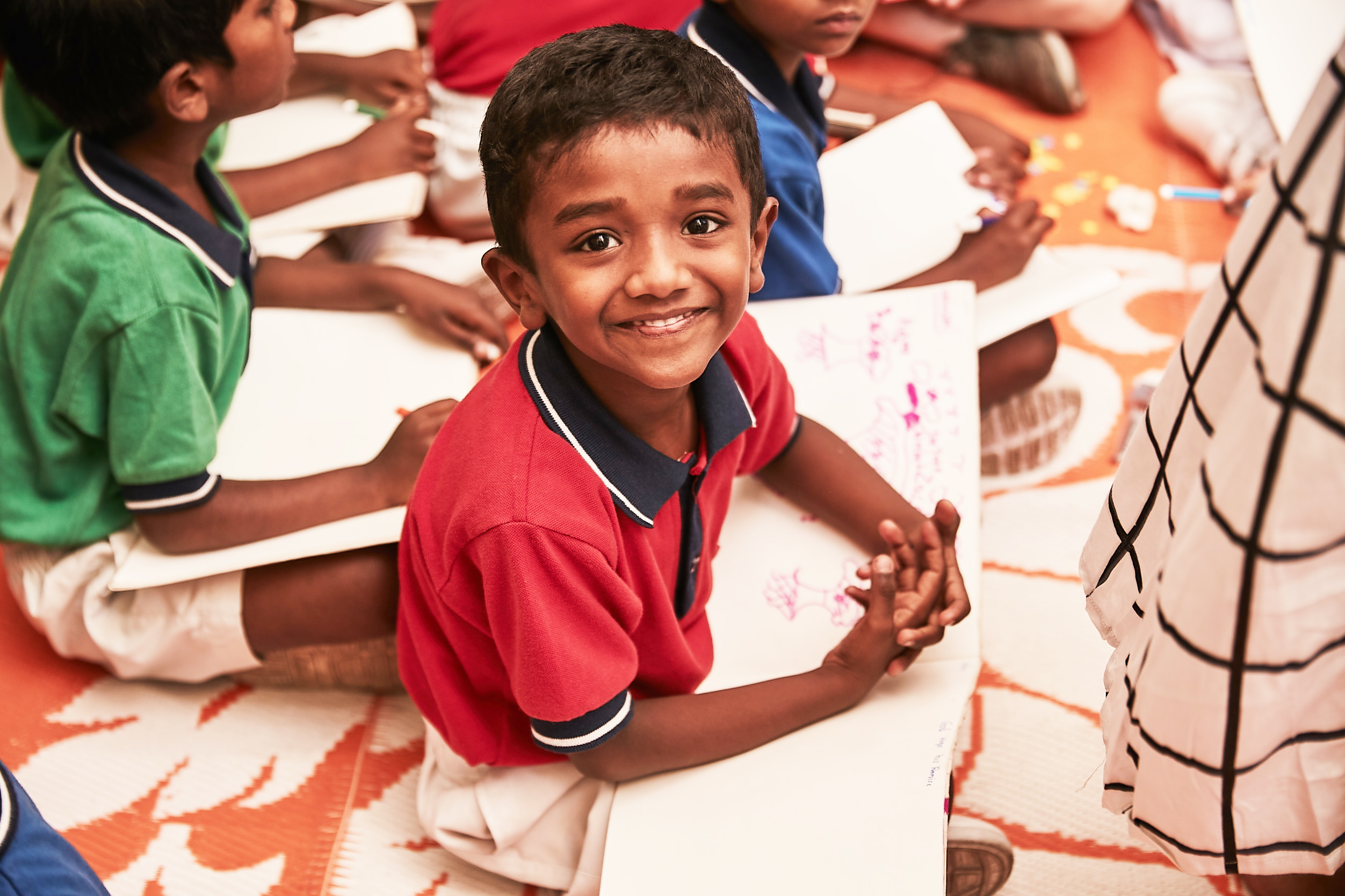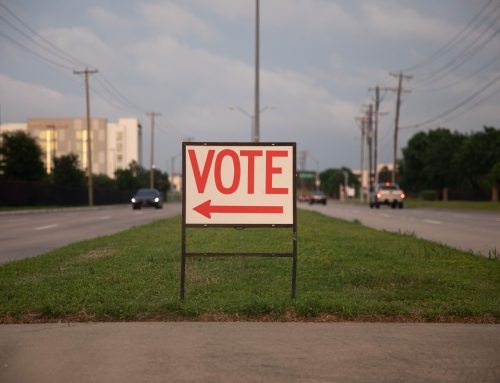
Photography by Matt Hawthorne.
Wanting to learn about and help alleviate poverty and human trafficking, Christine Allen took a sabbatical from her corporate job at Frito Lay and connected with an organization in India, a country where her husband’s family had been medical missionaries. The experiences she had there — rescuing children from traffickers and witnessing how education kept kids off the streets — convinced her to leave the business world. She started a nonprofit, Ark of the Rainbow, and partnered with Indian organizations to set up a school in a rural area near Bangalore. They serve a community of about 10,000. Many of them lack running water, while just an hour away, the city houses a thriving tech industry.
Over time, our neighbor and her husband, Dana, cultivated donors to support the nonprofit. They educate children and families and provide jobs for Indian people. The Allens, who have lived in Lakewood for seven years, have five children ages 3-10.
What were some challenges you faced starting out with the nonprofit?
A lot of it has been educating people on how education can actually help prevent human trafficking and poverty and why it’s an important piece of the puzzle as you’re trying to attack a broader social issue. But the more you can give people kind of long-term, better job opportunities, as well as keep vulnerable children off the streets, it really does make a huge difference. Trying to run a nonprofit that’s halfway across the world while we have five kids, that’s been tricky.
How has the pandemic affected the nonprofit?
Sixth grade and above is able to be open right now. But for the last year and a half to two years, all the lower schools have been closed, which is really impacting students in India. So we’re doing virtual school, but virtual school with a very poor community is very different than what you would see in Lakewood. So here, everyone was able to access WiFi, and they’re given their laptops and their Chromebooks and things like that. And in India, we really have to be more creative about it. Each week, our teachers will print out worksheets and different things for the students. And then they’ll go and literally distribute them outside each of the homes of all the students in the school. And then oftentimes, we’re working with families that don’t have internet or anything like that. But parents might have one cell phone, and WhatsApp is prevalent in India. So our teachers will WhatsApp student lessons, and then the parents will pick up the worksheets outside their home and work through them with their kids. But because we’re dealing with a lot of uneducated parents as well, that’s not always easy. And so our teachers in India have been able to bring in students kind of one by one for tutoring, and to make sure that they’re caught up with our lessons and to really try to retain as much knowledge as possible.
Has the way you think about human trafficking in the U.S. changed?
We started the nonprofit in India first, and then we became a foster family here because we had a heart for vulnerable children. The problems we see with human trafficking don’t translate the same way from India to the U.S. So in India, you see a couple of things. You see families that have no job options, very little education. They’re struggling to just feed their families. There are times when they’re either tricked into selling their children into human trafficking or sometimes they even willingly will sell their children because they’re so desperate to feed their families. In the U.S., you’ll see there’s just a lot of vulnerable teenagers who succumb to human trafficking, whether they’re runaways or foster children or things like that. It’s a little bit different, I think, the population that it affects, and probably the way to address it is a little bit different.

How do you see Ark of the Rainbow making a difference?
The area that we work in India, there are no other quality education options. We have very long waiting lists for our services. And we know that families really appreciate the high-quality education that we’re able to provide, in addition to the fact that our school teaches in three languages, but one of them is English, which really opens up a lot of doors that would not otherwise be open for these children. I think the other thing is, we do a lot of prevention and awareness on human trafficking. And we’ve seen that play out in multiple situations where our student population has been able to protect themselves, or we’ve been able to rescue and retrieve students who have actually been trafficked and kidnapped because of being able to be aware of the situation early and being trained and know what to do. Also, we do provide college scholarships to students that continue with their studies. And we’ve seen children come from uneducated families, go through our program, and then come back as teachers in our school one day. They’re changing the lives of the next generation of students and their community.
Who is on the ground, running the nonprofit?
We employ local people who have grown up in these communities. People have believed in them and sent them on for education. And so now, they’re turning around and trying to help their own communities. They’re very well-trusted and really understand the needs of the people.
What else have you done this year?
We’ve had to do a lot of emergency food and medicine for families who just can’t afford it. We’ll feed a family if they don’t have food, and sometimes their families are divided, because they have to send their children away because they can’t feed them. And that brings the family back together. We’ve paid for kidney transplants for people or whatever comes up, and so we know that we’re saving lives every day.
Interview has been edited for clarity and brevity.






